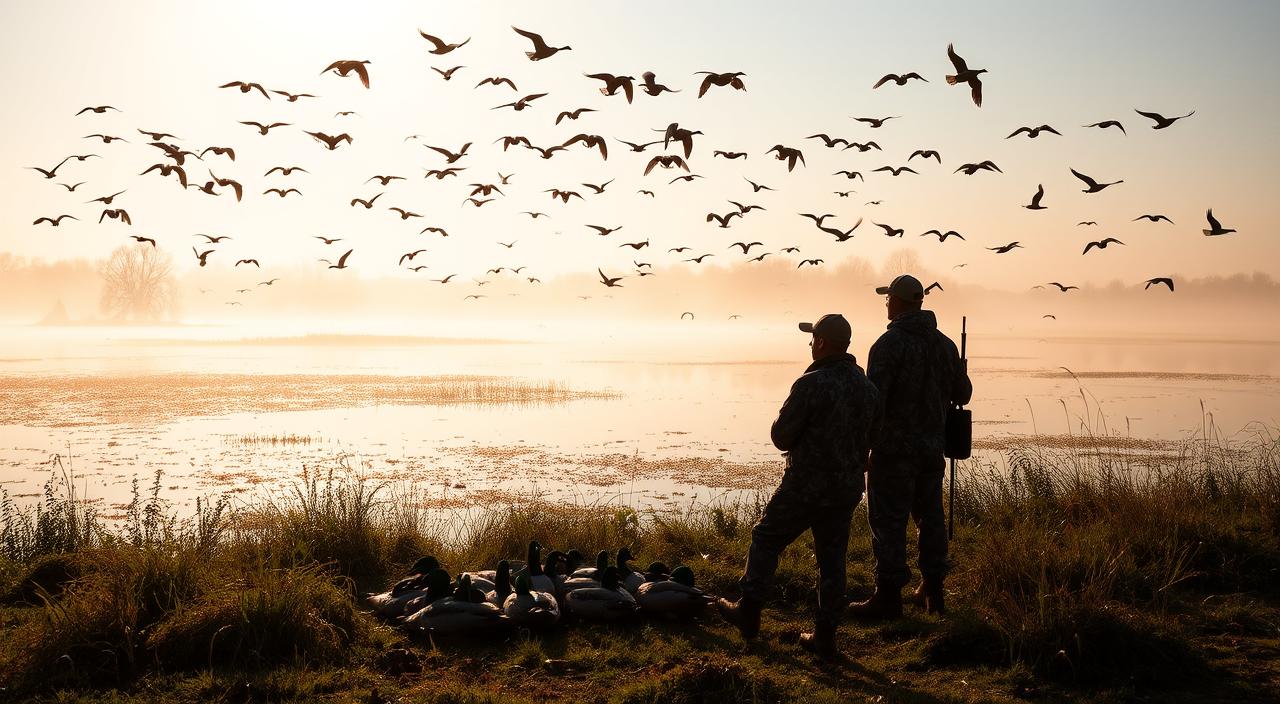Arkansas is known as a top spot for duck hunting. It’s along the famous Mississippi Flyway. This place is full of mallards and other waterfowl that come to its flooded areas and rice fields.
Local guides with lots of experience are ready to help. They know the area well and make sure you have a great time. You’ll leave with memories that last a lifetime.
Arkansas has many different landscapes for hunting. You can hunt in the Grand Prairie’s wetlands or the bottomland hardwoods. It’s a place where you can have amazing waterfowl hunting experiences.
Whether you’re new to hunting or have been doing it for years, Arkansas has something for everyone. The beauty of the state, the abundance of game, and the knowledge of the guides make it a unique experience. You’re sure to have a great time and maybe even catch some ducks.
Understanding Arkansas’s Rich Waterfowl Heritage
Arkansas is a key spot in the Mississippi Flyway, a major route for waterfowl migration. This route, from Canada to the Gulf of Mexico, brings millions of ducks and geese to the state. This makes Arkansas a top place for duck hunting.
The Mississippi Flyway Advantage
The Mississippi Flyway’s wetlands and rivers make Arkansas great for duck hunting. The state’s varied landscape, including the Arkansas Delta, draws many duck species. Hunters can find mallards, wood ducks, pintails, and teal here.
Peak Hunting Seasons and Migration Patterns
- Early teal season in September, targeting early-migrating blue-winged and green-winged teal
- Late duck season from November through January, coinciding with the peak of the Mississippi Flyway migration
- Opportunities for late-season hunts as ducks and geese linger in Arkansas until spring
Local Conservation Efforts and Sustainability
Arkansas is dedicated to protecting its waterfowl. Public and private groups, like Ducks Unlimited, work to save wetlands. This ensures a future for waterfowl in the state. Their efforts keep Arkansas a top spot for duck hunting.
Premier Duck Hunts Arkansas: Guide Services and Locations
Arkansas is famous for its amazing duck hunting spots. The state’s top guide services help hunters find these places. From Stuttgart, known as the Duck Capital of the World, to the Bayou Meto Wildlife Management Area, there’s something for everyone.
Guides like Delta Waterfowl and Stuttgart Duck Hunters offer great guided hunts. They provide expert advice, local knowledge, and comfortable lodges. Hunters also get access to the best equipment and hunting strategies for Arkansas’s waterfowl.
Arkansas is the perfect place for a top-notch duck hunting trip. The guides make sure hunters have a great time, whether they’re hunting mallards or teal. Even beginners can have a successful hunt in beautiful spots.
Arkansas has vast wetlands and wildlife areas along the Mississippi Flyway. With the help of top outfitters, hunters can dive into the state’s rich waterfowl heritage. It’s a must-visit for any duck hunting enthusiast.
Essential Gear and Preparation for Arkansas Duck Hunting
Going on a duck hunt in Arkansas needs more than just a good shotgun. You must prepare well and have the right gear. This can turn a good hunt into a great one. Let’s look at the key items every duck hunter should have for their Arkansas trip.
Recommended Shotguns and Ammunition
For shotguns for waterfowl, hunters in Arkansas often choose 12-gauge or 20-gauge semi-automatic or pump-action guns. These guns are powerful and accurate. They work well in Arkansas’s different habitats. With the right duck hunting gear, like steel or tungsten shot, these shotguns can be very effective.
Weather-Appropriate Clothing and Waders
The weather in Arkansas can change quickly. It can be mild or cold, with rain that can be light or heavy. Good hunting waders and warm, moisture-wicking clothes are key. They keep you dry and warm, helping you stay focused and energetic.
Duck Calls and Decoy Strategies
Knowing how to use duck calls and setting up decoys well can really help. Learn about different duck calls and practice using them. Try out different decoy setups to attract ducks. These skills are important for a successful hunt.
With the right duck hunting gear, the right guns and ammo, and good calling and decoy skills, you’re set for a great duck hunting trip in Arkansas.
Hunting Methods and Techniques in Arkansas Waters
Arkansas’s wetlands offer exciting duck hunting spots. You can hunt in flooded timber or vast rice fields. Each place requires different hunting methods.
In the flooded timber, jump shooting is key. Hunters move quietly, ready to surprise ducks. They must be quick and accurate with their shots.
The rice fields are perfect for pass shooting. Hunters line up along the ducks’ flight paths. They aim to catch the birds as they fly to their next stop.
- Flooded timber hunting requires stealth and quick reflexes for jump shooting.
- Rice field hunting often involves pass shooting, taking advantage of the ducks’ flight patterns.
- Adapting techniques to changing weather and waterfowl behavior is key for successful Arkansas duck hunts.
Successful duck hunting in Arkansas means knowing how to adjust to changing conditions. Hunters who understand the wetlands have a better chance of a successful hunt. This leads to a memorable waterfowl experience.
| Hunting Method | Key Considerations | Advantages |
|---|---|---|
| Jump Shooting | Stealth, quick reflexes, precise shooting | Opportunity to flush and take ducks in tight quarters of flooded timber |
| Pass Shooting | Timing, understanding flight patterns, strategic positioning | Capitalize on the ducks’ natural movements in open rice field habitats |
Conclusion
Arkansas is a top spot for duck hunting. It has a rich history of waterfowl and is on the Mississippi Flyway. This makes it a great place for hunting.
Whether you’re experienced or new to hunting, Arkansas has something for you. Guided duck hunts offer a chance to learn from experts. You’ll get to use the best gear and learn about local hunting.
Before you go duck hunting in Arkansas, remember to hunt responsibly. Help local conservation efforts and hunt sustainably. This way, duck hunting can continue to be enjoyed by future generations.

